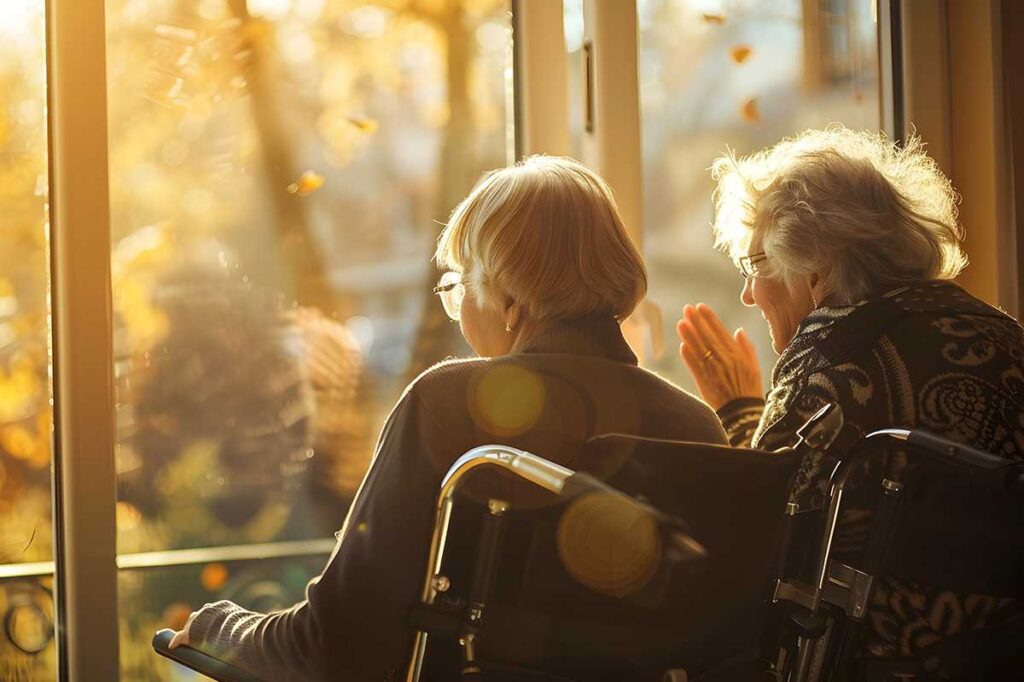Caring for a loved one with dementia is a journey filled with unexpected behaviors. For many adult children, watching their once-vibrant parent become confused and restless as dusk falls can be heart-wrenching. Those behaviors are symptomatic of sundowners syndrome, which is distressing for individuals experiencing them as well as their loved ones.

At Novellus Cypresswood, we tell family members that understanding and compassionate care can brighten these twilight moments, offering comfort and hope for better days ahead. Even if a loved one with dementia does not have those symptoms, it’s wise to learn about this condition because sundowning in the elderly is common.
The Alzheimer’s Caregivers Network claims that 20 percent of individuals with Alzheimer’s have this condition. In fact, many assisted living residents transition to memory care over time.
What is Sundowners Syndrome?
Sundowning is a group of behaviors related to Alzheimer’s and other forms of dementia. When present, sundowning symptoms occur in seniors during the evening hours.
As the sun sets, many individuals with cognitive impairments may experience heightened levels of distress. They can manifest as increased confusion, restlessness, or even aggression. Caregivers often witness their elderly loved ones struggling with these emotions after a long day, leading to concerns about health and emotional well-being.
What is the Cause of Sundowning?
The precise cause of sundowners syndrome remains unclear, but several factors may contribute to its development. The natural changes in light can disrupt circadian rhythms, leading to confusion. Reduced daylight can also lower mood, resulting in feelings of unease as evening approaches.
Additionally, fatigue accumulates throughout the day, potentially overwhelming an individual already dealing with cognitive decline. Stressors such as changes in the environment, routine disruptions, or unfamiliar situations can worsen symptoms.
What Are the Early Signs of Sundowners?
Recognizing early signs of sundowning can help you respond proactively to your loved one’s needs.* Some common behaviors include:
- Increased irritability
- Anxiety
- An inclination to wander
- Pacing
- Mood swings
- Fear
- Anxiety
- Hallucinations
If you notice that your loved one becomes more frustrated or disoriented during the early evening hours, you’re likely witnessing what is known as sundowning behavior. Observe changes in mood as evening approaches, as these patterns are often predictable for individuals affected by this condition.
Keeping a journal of these episodes can help you identify triggers or patterns, which can lead to more effective solutions. We also recommend speaking to your loved one’s physician about your concerns; they might recommend a higher level of care.
Effectively Addressing Symptoms of Sundowning in the Elderly
These practical strategies can ease your loved one’s transition into evening hours. Here are several actionable tips for this challenging time:
- Create a Calm Environment. A soothing atmosphere can significantly impact your loved one’s mood. Dim lights, quiet spaces, and familiar surroundings can all help ease sundowning behavior. Tranquil activities, like reading or listening to soft music, can also promote relaxation.
- Maintain a Routine. A predictable schedule can help your senior feel confident. Aim for regular meal times, activities, and bedtime routines. That can reduce confusion and help them maintain a positive outlook.
- Encourage Physical Activity. During the day, encourage your loved one to engage in physical activity; gentle exercise can enhance mood and reduce anxiety levels. Short walks or light stretching can energize them, making the transition to the evening easier.
- Limit Stimulation. As evening approaches, minimize loud noises and excessive interactions to create a peaceful atmosphere. If necessary, redirect attention from overstimulating stimuli, like the TV or intense conversations. Quieter activities can help center them during this time.
- Monitor Diet and Hydration. Diet can also play a role in mood and behavior. Ensure your loved one maintains a balanced diet throughout the day. Pay attention to their fluid intake, as dehydration can exacerbate confusion and irritability.
- Utilize Comfort Objects. Familiar items, like photographs or cherished belongings, can provide a sense of peace. Encourage them to engage with these objects to help trigger positive memories and diminish feelings of distress.
- Seek Professional Support. Don’t hesitate to reach out for guidance. Medical professionals can provide insights into how to help with sundowning.
The Novellus Cypresswood Caregivers Understand How to Help Sundowners
Our Spring, TX assisted living and memory care community is half an hour north of Houston. We understand the unique needs of individuals experiencing sundowning behavior and help manage their symptoms.
Novellus Cypresswood provides highly personalized care, enhanced by a support team that handles daily living tasks, cooking, and cleaning for these beloved residents. Our support, services, activities, and events help these residents pursue their interests and live their best lives.
- 24/7 associates
- Individualized service plans
- Medication management
- Personal care assistance with mobility, bathing, grooming, and dressing
- Restaurant-style dining
- Thoughtfully designed memory care floor plans
- Favorable caregiver-to-resident ratio
- On-site beauty salon
- Enclosed garden, walkways, and patio
These seniors benefit from a loving environment with supportive care and opportunities for peer interactions. It feels empowering to them as well as their caregivers; choosing care at Novellus Cypresswood means peace of mind for you and your family.
Novellus Cypresswood Offers Exceptional Care for Your Family
Our comprehensive memory care services improve our residents’ quality of life, and you can return to being a daughter or son again. Community spirit is an essential aspect of daily life at Novellus Cypresswood, and we invite you to experience it in person. Find meaning through connection; contact us to schedule a tour and ask how we can help with sundowning behavior.
